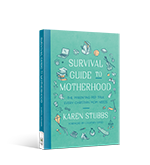
Sign Up for Updates
Connect
TOPICS
- Latest Blog
- Fiction
- Inspirational/Devotional
- Men's Christian Living
- Prophecy
- Women's Christian Living
- View All
ARCHIVES
Why Should You Read Revelation? Pondering God’s Final Chapter in His Word
Posted on May 09, 2023 Topic : Men's Christian Living, Prophecy, Women's Christian Living
Posted by : Jeff Kinley

When we come to the last book of the Bible, we would expect a dramatic and powerful conclusion to God’s grand story and message to us. Think about this: God could have ended his written revelation to us any way he wanted to. As an author, I do the same. I carefully consider how I conclude my books. What do I want the reader to know, think, feel, or do upon turning the last page? What do I want to impress upon him? How do I wish her to respond?
And God, being the master storyteller and consummate communicator, did the same with his book. He could have finished the Bible with a message on how to love one another, or how to be good Samaritans to our neighbors, or even by reviewing and summarizing some of the important truths he had previously communicated.
But he didn’t.
Instead, he finished his magnus opus with a book that is 95 percent prophecy. As such, Revelation is almost exclusively a book about the future. But why? Why tell his first-century audience about prophecies that not only wouldn’t end up happening in their lifetime, but wouldn’t be fulfilled for at least 1,900 years?
I suppose the original hearers and readers of Genesis, Isaiah, Jeremiah, and Micah could ask the same question, for they, too, were given prophecies that were eventually fulfilled many hundreds of years after they were first given. But this highlights the very nature of prophecy—that it is primarily a foretelling of future events and not necessarily things that are happening “in the now.”
So why did God end his written Word with a book on future prophetic events? Because he has unfinished business to attend to. And because…
- He has a bride to rescue (John 14:1-3; 1 Thessalonians 4:13-18).
- He has a people to redeem (3 Peter 3:9; Revelation 7:9-17).
- He has a planet to punish (Revelation 6–19).
- He has a nation to restore—Israel (Romans 11:25-26).
You see, the story isn’t over. There is yet coming a climactic season-ending episode. A closing act.
A grand finale.
God wrote Revelation because he wants us to know about that finale, and to respond to it (Revelation 1:3). He wants us to be aware of coming world events and to spot the signs leading up to the end times. He wants us to enjoy a sneak preview of our future home in heaven. He also knew that in these last days, there would be a pandemic of confusion, ignorance, and uncertainty. Fear is currently outpacing faith among God’s people. In the church, confusion is clouding clarity. Ignorance is spreading faster than knowledge. And uncertainty is overshadowing confidence.
The ultimate antidote to ignorance is truth—God’s truth.
The book of Revelation is a climactic book of knowledge, not confusion. It is not an enigmatic, apocalyptic code only to be broken by a select few experts, but rather, a book of enlightenment to be read, heard, understood, and obeyed by everyone who traverses its pages (Revelation 1:3).
In its very first verse we discover Revelation to be a book about God. It is “the Revelation of [from, about] Jesus Christ.” It comes through an angel, to John, and for his bond-servants (the church). And what will the book cover? “The things which must soon take place” (1:1). Revelation is the only book in the Bible that comes with a certain kind of promised blessing for a certain group of believers—namely, those who “read, hear, and heed the words of the prophecy” (verse 3).
Why is this blessing for the readers of Revelation so important? Verse 3 concludes, “For the time is near.” If it was near when John first wrote those words, it is even nearer to us today. Open Revelation and let’s prepare for God’s grand finale.

Read more in God's Grand Finale by Jeff Kinley

